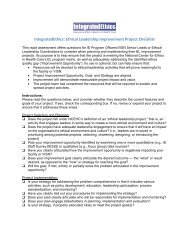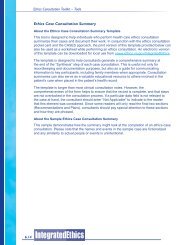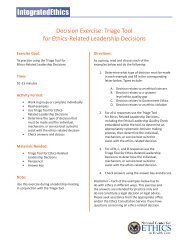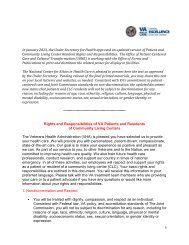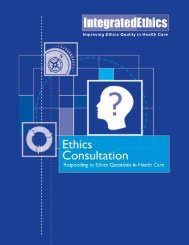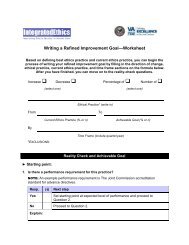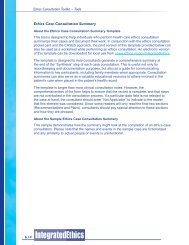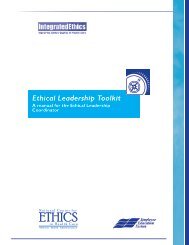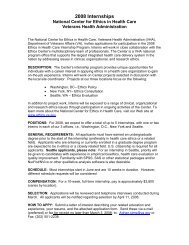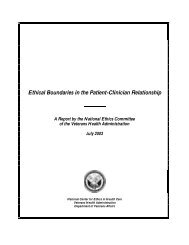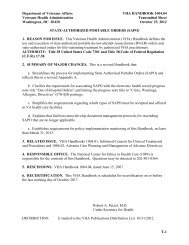Preventive Ethics - National Center for Ethics in Health Care - US ...
Preventive Ethics - National Center for Ethics in Health Care - US ...
Preventive Ethics - National Center for Ethics in Health Care - US ...
You also want an ePaper? Increase the reach of your titles
YUMPU automatically turns print PDFs into web optimized ePapers that Google loves.
Part I: Introduction to Integrated<strong>Ethics</strong><br />
A healthy ethical environment and culture doesn’t just improve employee morale; it also<br />
helps to enhance productivity and improve efficiency.[14–16] Organizations that support<br />
do<strong>in</strong>g the right th<strong>in</strong>g, do<strong>in</strong>g it well, and do<strong>in</strong>g it <strong>for</strong> the right reasons tend to outper<strong>for</strong>m<br />
other organizations <strong>in</strong> terms of such measures as customer satisfaction and employee<br />
retention.[17,18] Failure to ma<strong>in</strong>ta<strong>in</strong> an effective ethics program can seriously jeopardize an<br />
organization’s reputation, its bottom l<strong>in</strong>e, and even its survival.[19]<br />
<strong>Ethics</strong> is also closely related to quality. A health care provider who fails to meet established<br />
ethical norms and standards is not deliver<strong>in</strong>g high-quality health care. By the same token,<br />
failure to meet m<strong>in</strong>imum quality standards raises ethical concerns. Thus ethics and quality<br />
care can never truly be separated.<br />
The Concept of <strong>Ethics</strong> Quality<br />
When most people th<strong>in</strong>k of quality <strong>in</strong> health care, they th<strong>in</strong>k of technical quality (e.g.,<br />
cl<strong>in</strong>ical <strong>in</strong>dicators) and service quality (e.g., patient satisfaction scores). But ethics quality is<br />
equally important.[20] <strong>Ethics</strong> quality means that practices throughout an organization are<br />
consistent with widely accepted ethical standards, norms, or expectations <strong>for</strong> a health care<br />
organization and its staff—set out <strong>in</strong> organizational mission and values statements, codes<br />
of ethics, professional guidel<strong>in</strong>es, consensus statements and position papers, and public<br />
and <strong>in</strong>stitutional policies.<br />
For example, let’s say a patient undergoes a surgical procedure. From a technical quality<br />
perspective, the operation was perfectly executed, and from a service quality perspective,<br />
the patient was perfectly satisfied with the care he received. So the care was of high quality,<br />
right? Well, not necessarily. Imag<strong>in</strong>e that the patient was never really <strong>in</strong><strong>for</strong>med—or was<br />
even mis<strong>in</strong><strong>for</strong>med—about the procedure he received. This would <strong>in</strong>dicate a problem with<br />
ethics quality.<br />
The idea of ethics quality as a component of health care quality isn’t exactly new.<br />
Donabedian, who is widely regarded as the father of quality measurement <strong>in</strong> health care,<br />
def<strong>in</strong>ed quality to <strong>in</strong>clude both technical and <strong>in</strong>terpersonal components, <strong>in</strong>terpersonal<br />
quality be<strong>in</strong>g def<strong>in</strong>ed as “con<strong>for</strong>mity to legitimate patient expectations and to social and<br />
professional norms.”[21] Other experts have proposed “ethicality”—the degree to which<br />
cl<strong>in</strong>ical practices con<strong>for</strong>m to established ethics standards—as an important element of<br />
health care quality.[22] And it’s been argued that specific per<strong>for</strong>mance measures <strong>for</strong> ethics<br />
should be rout<strong>in</strong>ely <strong>in</strong>cluded <strong>in</strong> health care quality assessments.[20]<br />
<strong>Ethics</strong> Quality Gaps<br />
<strong>Health</strong> care organizations <strong>in</strong> this country have significant “opportunities <strong>for</strong> improvement”<br />
with respect to ethics quality,[23] and VA is no exception. Over the past several years, VA’s<br />
<strong>National</strong> <strong>Center</strong> <strong>for</strong> <strong>Ethics</strong> <strong>in</strong> <strong>Health</strong> <strong>Care</strong> has been collect<strong>in</strong>g data on the VA health care<br />
system—through <strong>for</strong>mal and <strong>in</strong><strong>for</strong>mal surveys, <strong>in</strong>terviews, and focus groups—to understand<br />
where there are ethics quality gaps. What have we found?<br />
VA employees:<br />
• regularly experience ethical concerns<br />
• want more tools and support to address their concerns<br />
• perceive that the organization doesn’t always treat ethics as a priority



